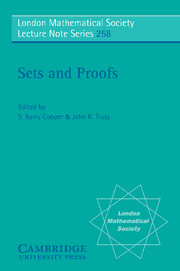Book contents
- Frontmatter
- Contents
- Preface
- An Introduction To Finitary Analyses Of Proof Figures
- What Mathematical Truth Could Not Be – II
- Proof Search in Constructive Logics
- David's Trick
- A Semantical Calculus for Intuitionistic Propositional Logic
- An Iteration Model Violating the Singular Cardinals Hypothesis
- An Introduction to Core Model Theory
- Games of Countable Length
- On the Complexity of the Propositional Calculus
- The Realm of Orinal Analysis
- Covering Properties of Core Models
- Ordinal Systems
- Polish Group Topologies
- Forcing Closed Unbounded Subsets of Nw+1
- First Steps into Metapredicativity in Explicit Mathematics
- What Makes A (Pointwise) Subrecursive Hierarchy Slow Growing?
- Minimality Arguments for Infinite Time Turing Degrees
First Steps into Metapredicativity in Explicit Mathematics
Published online by Cambridge University Press: 05 September 2013
- Frontmatter
- Contents
- Preface
- An Introduction To Finitary Analyses Of Proof Figures
- What Mathematical Truth Could Not Be – II
- Proof Search in Constructive Logics
- David's Trick
- A Semantical Calculus for Intuitionistic Propositional Logic
- An Iteration Model Violating the Singular Cardinals Hypothesis
- An Introduction to Core Model Theory
- Games of Countable Length
- On the Complexity of the Propositional Calculus
- The Realm of Orinal Analysis
- Covering Properties of Core Models
- Ordinal Systems
- Polish Group Topologies
- Forcing Closed Unbounded Subsets of Nw+1
- First Steps into Metapredicativity in Explicit Mathematics
- What Makes A (Pointwise) Subrecursive Hierarchy Slow Growing?
- Minimality Arguments for Infinite Time Turing Degrees
Summary
Abstract
The system EMU of explicit mathematics incorporates the uniform construction of universes. In this paper we give a proof-theoretic treatment of EMU and show that it corresponds to transfinite hierarchies of fixed points of positive arithmetic operators, where the length of these fixed point hierarchies is bounded by ε0.
Introduction
Metapredicativity is a new general term in proof theory which describes the analysis and study of formal systems whose proof-theoretic strength is beyond the Feferman-Schütte ordinal Γ0 but which are nevertheless amenable to purely predicative methods. Typical examples of formal systems which are apt for scaling the initial gart of metapredicativity are the transfinitely iterated fixed point theories IDα whose detailed proof-theoretic analysis is given by Jäger, Kahle, Setzer and Strahm in [18]. In this paper we assume familiarity with [18]. For natural extensions of Friedman's ATR that can be measured against transfinitely iterated fixed point theories the reader is referred to Jäger and Strahm [20].
In the mid seventies, Feferman [3, 4] introduced systems of explicit mathematics in order to provide an alternative foundation of constructive mathematics. More precisely, the origin of Feferman's program lay in giving a logical account of Bishop-style constructive mathematics.
- Type
- Chapter
- Information
- Sets and Proofs , pp. 383 - 402Publisher: Cambridge University PressPrint publication year: 1999
- 6
- Cited by



